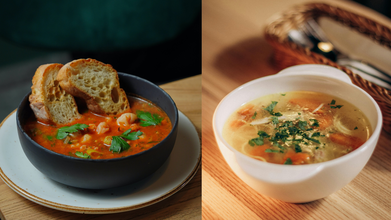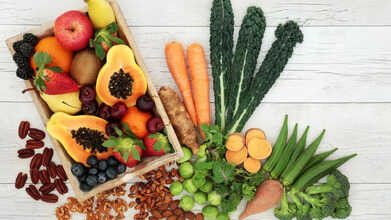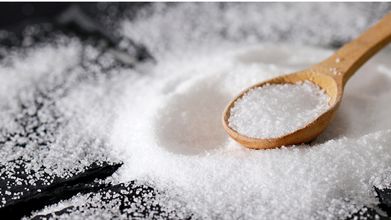- Health Conditions A-Z
- Health & Wellness
- Nutrition
- Fitness
- Health News
- Ayurveda
- Videos
- Medicine A-Z
- Parenting
This Traditional Japanese Diet Might Be Nature's Cure For Depression

Credits: iStock
The world has long been in awe of Japan's washoku, its traditional diet, for its ability to promote longevity and strong physical well-being. But emerging research shows that the virtues of the old diet may reach beyond the body to provide essential insurance for the mind too. In a big study released in the journal Psychiatry and Clinical Neurosciences, researchers found strong evidence to believe that a traditional Japanese diet may protect against depression, a mental health crisis that plagues millions worldwide.
Mental health has become a worldwide issue in recent years, with depression reaching millions of people across the world. Although diet plays a well-proven role in physical health, its possible role in mental health has only recently gained attention.
What Is Washoku?
Washoku, which is a cultural heritage passed down by UNESCO, is a traditional Japanese meal pattern with high content of seasonal foods and well-balanced nutrition. The diet commonly consists of white rice, miso soup, fish, soy foods, seaweed, mushrooms, steamed vegetables, and green tea. This eating habit is honored not only because of the flavor but also due to its nutritional balance.
Although the health advantages of washoku for heart disease, diabetes, and longevity have been established, its possible influence on mental health has only begun to receive scientific attention in recent times.
Research: The Link Between Washoku Diet and Depression?
Between 2018 and 2021, scientists questioned almost 12,500 workers from five large Japanese businesses. The volunteers, who were mostly men with an average age of 42.5, completed extensive questionnaires about their weekly intake of foods and beverages. The researchers then rated their compliance with washoku on two scales: the classic 0-to-9 scale and a revised 0-to-11 scale that added other foods that have been shown to aid mental health, including fruit, raw vegetables, and dairy.".
Of critical note, the researchers also tested for depressive symptoms, with 30.9% of survey respondents expressing feelings of despondency or demoralization—an extremely high percentage and one that reflects worldwide trends in workplace mental health.
The findings were dramatic. The more participants scored on the washoku diet questionnaires, the less likely they were to have symptoms of depression. When they were split into four groups according to diet compliance, those who consumed most washoku were 17% to 20% less likely to have depressive symptoms than those who consumed the minimum.
To ensure accuracy, the researchers statistically adjusted for a range of non-diet factors—including age, gender, marital status, education, job position, alcohol intake, smoking, exercise, sleep, and obesity—minimizing the risk that something other than diet was driving the results.
Why Washoku Diet Might Protect Your Mental Health?The researchers highlighted several possible mechanisms:
Folate and Neurotransmitters
Seaweed, vegetables, and soy foods in the washoku diet are good sources of folate, a B vitamin used to make neurotransmitters such as serotonin and dopamine that control mood and emotional health.
Omega-3 Fatty Acids
Fatty fish, a cornerstone of the washoku diet, is filled with omega-3s, which have anti-inflammatory properties and are associated with lower depression risk.Antioxidants
Vegetables of bright color, green tea, natto, and miso contain antioxidants that decrease oxidative stress in the brain—a component involved with depression.
Umami and the Nervous System
The distinctive umami taste of Japanese cuisine can activate the parasympathetic nervous system, which helps lead to mental calmness and stability.
Washoku vs. Other Diets: How Does It Compare?
Even though fewer studies have examined the impact of the washoku diet on mental health, comparable trends have been seen in analyses of the Mediterranean diet, which also focuses on vegetables, whole grains, and fish. That similarity lends credence to the hypothesis that nutrient-rich, traditional diet styles may have similar protective features against depression.
Diet is a major factor, but mental health is determined by a multitude of other variables, such as stress levels, sleep quality, social support, and genetic makeup. The Japanese study controlled for some of these by adjusting for confounders, but experts stress the need for more holistic approaches to lifestyle intervention.
Washoku is not so much about what is on the plate—it's about how food is prepared, shared, and consumed. Meals tend to be consumed slowly, with regard to presentation and seasonality, encouraging mindfulness and social connection. These cultural elements might also contribute to aiding mental health.
How You Can Add Washoku Diet To Your Routine?
If you’re looking to support your mental health through dietary changes, integrating elements of the washoku diet into your meals could be a smart move. Focus on whole, minimally processed foods such as:
- Steamed rice or other whole grains
- Miso soup and fermented soy products
- Grilled or simmered fish
- Seaweed and mushroom dishes
- Green tea as a daily beverage
And although the entire washoku diet may not be practical or appealing to all, the underlying philosophy—variety, balance, and nutritional value—can be translated into much cultural and regional cuisine.
As depression reaches epidemic levels in many parts of the world, these results could have potentially broad-ranging consequences. Promoting traditional diets such as washoku could be a straightforward, culturally acceptable means of promoting mental health—particularly in the workplace and communities.
"More studies need to be done, but we would like evidence presented among Japanese individuals to be used in public health practices in workplaces and districts relating to depression prevention," the Japan Institute for Health Security stated in a press release.
Soup Debate: Chicken Or Tomato? A Dietitian Finally Answers Which One Is Healthier

Credits: Canva
Soup debate between chicken and tomato may have come to an end, with a dietitian telling us which one is the healthier option. For many Americans, January is the National Soup Month, which means they go back to their comfort and easy to make food like soup. With the surge in flu activity in the US, people are consuming soup to get relief. Amid all this, Vandana Sheth, a plant-based dietitian and a diabetes expert tells Fox News the better option. The California-based dietitian says that both soups could be comforting. However, she points out, the nutrition profiles could vary based on the preparation.
Chicken Soup Vs Tomato Soup
Soup's nutrition profile runs through a spectrum of healthy to fatty and caloric. "Choose versions with no added sugars, minimal saturated fat and lower sodium to keep them healthy. When able, enjoy homemade or minimally processed options with fresh vegetables, lean protein and other fiber-rich options," she said.
Also Read: NHS England Expands Access To Life Saving Prostate Cancer Drug
What Is In A Chicken Soup?
Michelle Routhenstein, a New York-based cardiologist, as reported by Fox News, said a standard serving size of chicken noodle soup, which is around one cup, usually contains somewhere around 100 to 150 calories, with 6 to 10 grams of protein, and 500 to more than 1500 milligrams of sodium.
However, Routhenstein also says that homemade chicken soup could also provide lean protein, B vitamins, and immune supporting zinc. There have been studies that show that chicken soup have eased many from their cold symptoms, like nasal congestion and anti-inflammatory effects. However, not all chicken soups are safe. Commercially prepared soups may have a higher level in sodium, which could have a negative impact on blood pressure.
What Should One Keep In Mind?
When buying chicken soup, one should always check labels for its sodium content and ensure it must be under 500 milligrams per servings. Sheth also suggests looking out for added sugars and flavors. Sheth also said if the soup is made with lean chicken, vegetables and has a light broth, it can by more nutrient rich. She also recommends to avoid cream-based broth, which could be higher in saturated fat.
What Is In A Tomato Soup?
Tomato soups have a completely different nutrition profile. "Per 1 cup serving, you will get 70–150 calories depending on [whether] it's broth-based or cream-based, lycopene and vitamins A and C, which can help support eye health and immunity," Sheth said. The sodium content could be lower than in chicken soup, somewhere between 400 to 900 milligrams, especially in canned versions.
Sheth said that when compared to chicken soup, tomato soup trails on protein scale. While Routhenstein highlighted lycopene, as one of the biggest benefits of tomato soup. It is an antioxidant that "may help with reducing inflammation, heart disease and immune health".
"Lycopene has also been studied for its benefit [in reducing the] risk of prostate cancer. Tomato soup is also rich in vitamin C and potassium, which also protect heart and immune health," she added.
Which Soup Is Better?
Routhenstein says for her, it is tomato soup, because of antioxidant content. However, when it comes to protein and keeping you full, Sheth says chicken soup is a better option.
This Everyday Breakfast Habit Could Quietly Cut Heart Disease Risk

Credits: Canva
A key ingredient found in a common breakfast food may play an important role in supporting heart health and keeping blood sugar levels steady. Fibre is an essential part of a balanced diet, and the NHS recommends that adults aim for at least 30g of fibre each day. Despite this, many people still fall short of the daily target, often without realising the long-term impact on their health.
Why Fibre Matters For Heart And Blood Sugar Health
Fibre is not a single substance. It exists in two main forms, and each affects the body in a different way. Insoluble fibre does not dissolve during digestion. Instead, it passes through the gut largely unchanged, adding bulk to stools and helping the bowels move regularly. This can lower the risk of constipation and reduce the chances of developing intestinal blockages.
How Soluble Fibre Helps Control Blood Sugar Levels
Soluble fibre behaves differently. When it comes into contact with water in the digestive system, it forms a gel-like substance. This slows the digestion and absorption of carbohydrates, helping to prevent sudden rises in blood sugar after meals. Because of this effect, soluble fibre can be particularly useful for people managing blood sugar conditions, including diabetes.
What Makes Beta-Glucan Especially Good For The Heart?
Beta-glucans are a specific type of soluble fibre that have attracted attention for their heart-protective benefits. According to the British Heart Foundation, beta-glucan is naturally present in all porridge oats and wholegrains. A standard 40g serving of porridge oats contains around 2g of beta-glucan, making it an easy addition to a heart-friendly diet.
Research suggests that beta-glucan may help improve blood sugar control over time. Studies have found that consuming up to 3.5g of beta-glucan daily can lower blood sugar levels and support better long-term glucose management in people with type 2 diabetes. A higher intake of beta-glucan has also been linked to a reduced risk of developing type 2 diabetes, likely due to its ability to slow sugar absorption.
Beta-Glucan And Its Link To Lower Cholesterol
Another study has highlighted the connection between regular beta-glucan intake and improved heart health. The findings showed that eating just 3g of beta-glucan each day for eight weeks led to a noticeable reduction in cholesterol levels. High cholesterol is a well-known risk factor for heart disease, so even small daily amounts of beta-glucan may offer meaningful benefits.
Sources Of Beta-Glucan
Beta-glucan is found in a wide range of natural foods, including:
- Oats
- Rye
- Shiitake mushrooms
- Peas
- Seaweed
- Yeast
- Reishi mushrooms
- Apples
- Algae
- Barley
- Wheat
Including a variety of these foods in meals can help increase fibre intake in a balanced way.
Possible Side Effects Of Increasing Fibre Intake
As beta-glucan is a form of fibre, increasing intake too quickly can cause mild digestive discomfort. Some people may experience bloating, wind, or constipation, especially in the early stages. These symptoms can often be reduced by staying physically active and drinking enough fluids throughout the day.
If you are concerned about how fibre affects your body, it is advisable to speak with your GP or a qualified health professional. They can offer guidance tailored to your needs. More information on increasing fibre intake and its health benefits is also available on the NHS website.
Is Your Excessive Salt Consumption Increasing Your Risk Of A Stroke?

Credit: Canva
While the World Health Organization recommends 5g or a tablespoon of salt every day, Indians consume more than double, increasing their risk of having a fatal stroke exponentially.
According to EatRightIndia, Indians consume about 11g of salt each day through meals which can significantly increase their risk of high blood pressure, strokes and hypertension.
Hypertension causes over 1.6 million deaths annually, accounting for nearly 18 percent of all fatalities and heavily contributes to deaths caused by heart disease, stroke and kidney disease.
What Is Excessive Salt Dangerous?
The most important side effect of consuming excessive salt intake is high blood pressure. Salt causes the body to retain water, increasing the volume of blood in your vessels and leading to elevated pressure levels. If your blood pressure consistently measures over 140/90 mmHg, it's time to evaluate your salt consumption.
Over time, this can rapidly raise your risk for heart disease, stroke while also potentially contributing to stomach cancer and weakened bones. Additionally, high blood pressure damages kidneys and excess sodium can lead to kidney stones or disease.
Apart from a 5gm recommendation for adults, NHS suggests that children between seven to 11 years of age should not eat more than 5g of salt while those between four to six years of age should eat less than 3g of salt every day to maintain heart health.
How Can You Reduce Your Salt Consumption?
Both excessive and insufficient salt intake have been linked to adverse outcomes. Achieving the right balance is critical, and the best approach is to minimize processed food consumption rather than relying solely on the salt shaker.
Common items such as pickles, paapads, chutneys, salads and buttermilk significantly contribute to daily salt consumption. Hidden salts in packaged goods like biscuits, sauces, condiments and snacks also can increase your salt intake.
To cut down on your salt intake, experts recommend:
- Not adding salt in rice and dough for chapati, poori and paratha.
- Not sprinkling salt on salad, cut fruits, cooked vegetables or curd.
- Gradually reducing the salt usage while cooking from lesser to least.
- Limit food accompaniments like salted butter, salty spice mixes (chaat masala, jal jeera masala etc.), chutneys, pickles, ketchups, sauces and dressings as they contain excess salt.
- Baking soda, baking powder, and monosodium glutamate (MSG) also contains high sodium and should be avoided in your daily cooking.
- Not keeping salt on the table.
- Buying tinned vegetables, pulses or fish in water instead of brine.
- Being aware that some dissolvable tablets, such as painkillers, vitamins or prescription medicines, may be high in salt.
© 2024 Bennett, Coleman & Company Limited

